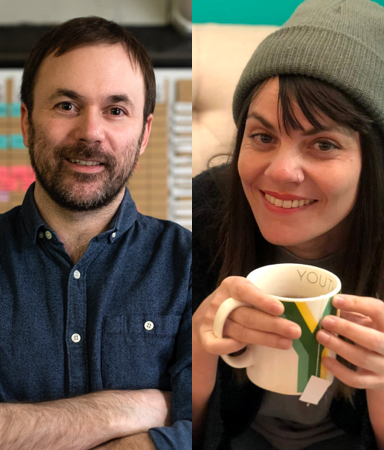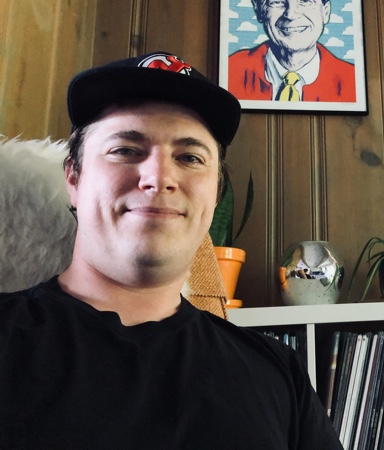Where are you based?
Montréal / Tiohtiá:ke
Where do you work? What do you do?
I’m currently working as the Director of Operations for Suoni Per Il Popolo, an experimental music festival. Our organisation has been going through some flux over the last couple of years and only just settled on titles. I have been involved in booking, curation, developing and implementing live streaming and now returning to live-show production.
What are you listening to?
I try to listen quite broadly. “Genre agnostic” as they say. Over the past couple of years as live music slowed down my listening habits went more international. In the pre-pandemic times, I would listen largely to local and regional acts. That way I was aware of what was happening in the scene for booking purposes.
These past couple of years I have been exploring a lot more of what’s happening in Africa (Nyege Nyege Tapes, Asher Gamedze) and the UK (Brownswood Recordings, Sault). Repetitive Music by Competition & Buffering Juju by Dumama + Kechou have been things I have played a ton of the last little while as well as the reissues for Universal Liberation Orchestra’s Communion and The Same’s Sync or Swim.
How do you discover new music?
Wire Magazine and Musicworks would be the print publications that I follow most closely – I also really like some of the stuff coming out in the quarterly Sound American. Online I look at The Quietus and Bandcamp daily. I’m not huge on the streaming platforms so I don’t follow any playlists. I do listen to some internet radio like FSR and N10.as. I follow some people on Twitter like the Tabs Out podcast and NYC-based music journalist Zach Lipez (whose newsletter abundant living is fantastic!). Often my friends and coworkers tell me about music. I think that is my main source of new recommendations. I have been reading Harry Sword’s Monolithic Undertow (which is a historical survey of drone music). And an interesting book on the origins of Kwaito called Kwaito Bodies: Remastering Space and Subjectivity in Post-Apartheid South Africa by Xavier Livermon.
What formats do you usually listen to? LP, CD, Cassette, Digital, Streaming Services? Why?
I was actually thinking of getting a CD player for my HiFi pre-pandemic and then when it hit, that was the push I needed. Sometimes, I fill in at a local record store Sonorama and there’s so many used CDs around that you can get amazing stuff for incredibly low prices. I definitely still buy cassettes. Records are something I love but I’m not a purist. I like listening to analog media because it takes my listening away from the screen. When I put something on my stereo system I get to have a little ritual around my listening – it becomes a more intentional moment. Anything I get through my phone or my computer is tied to the whole internet which is work which is distracting. That said, I use Bandcamp a ton.
“When I put something on my stereo system I get to have a little ritual around my listening – it becomes a more intentional moment.”
Where do you do most of your music listening?
I make a point of not listening too much while commuting or walking around – I prefer to listen to the city and sounds around me. I have a Sansui 661 receiver with Elac speakers the other components are all just cobbled together over the years, hand me down from friends or garbage finds – oh I guess except for the early aughts era NAD CD player I mentioned before.
How do you find and listen to pre-release music?
If I’m listening to pre-release music it is either a release I have played on, a mix sent to me for feedback by friends or a band that would like me to organise a show for them.
What are your frustrations with listening to music digitally? Any benefits?
I think digital is great for sharing music quickly. The fact that I can listen to albums from folks in Halifax or Vancouver, or even farther afield, just by clicking a link is great. I think the fact that digital music is tied to devices that are multi-functional means that it’s harder to focus just on listening.
How do you keep track of everything you are listening to?
I ‘wishlist’ of a lot of things on Bandcamp. I used to keep a running thread on my Twitter feed of cool releases I found on there but I have slowed on that so it’s mostly the wishlist feature now. If I find the music outside Bandcamp I tend to try to write it down in the margins of one of my various notebooks.
Do you tip other people off to new music? How?
My coworkers at Suoni Per Il Popolo and bandmates are the people I share music with the most. Generally I just tell them with my voice.
Anything you want to “promote”?
We held our first IRL edition of Suoni Per Il Popolo this June! Check that out here, and stay tuned.

I think Constellation Records has been doing a great job showcasing some fascinating Canadian music. Their recent releases from Joyfultalk, Kee Avil, Markus Floats, Jessica Moss, and Jason Sharp all come to mind.
Moyo Mutamba is an excellent mbira player coming out of Toronto. Celluloid Lunch is a record label and periodical that’s releasing and covering gnarly radical music. I think more than anything the best way to discover new music is to engage in your local scene. Going to concerts of local bands will introduce you to more local bands (some good some bad) and more than ever this is what gives life to the global music community. Everyone starts somewhere.




